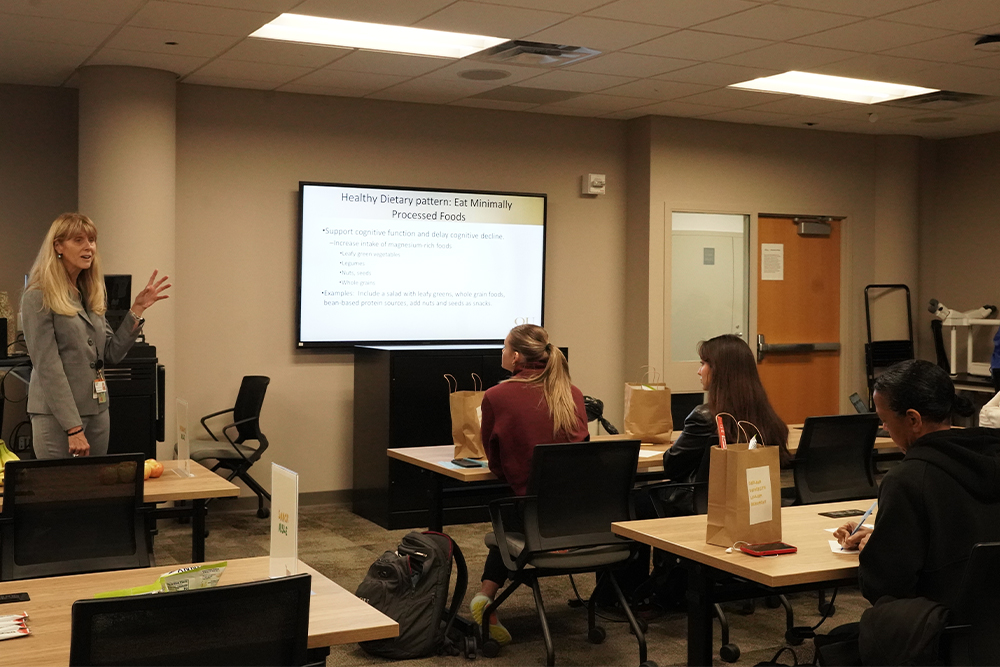Oakland University William Beaumont School of Medicine medical students recently participated in “Nourish to Flourish” — an event that emphasized nutrition and meal prepping.
Held Oct. 21, the event was hosted by Virginia Uhley, Ph.D., associate professor, Department of Foundational Medical Studies, associate professor, Department of Family Medicine and Community Health; Alex Roggebuck, M.A., administrative coordinator for Student Affairs; and Jennifer Root, Ed.D., assistant dean, Student Affairs and Career Development.
As students walked into the room, they were met with a diverse spread of quick snacks rich in nutrients: apples, bananas, sweet potatoes, tuna, rice, beans, beef sticks, popcorn, and more. Each student grabbed a grocery bag, selecting their favorites to replenish themselves throughout the day.
Members of the OUWB faculty said they found it beneficial to remind students that positive eating habits are just as important as the consecutive hours of studying.
“Just knowing the importance of why we should be eating a variety of different foods to get different nutrients is valuable — because sometimes it's hard,” said Uhley. “You don't have time to prepare food. Understanding the nutrients in foods and why they're important is something for them to think about.”
A slideshow presentation highlighted foods that can boost cognitive function and delay decline, what to eat to avoid obesity-related diseases, the classification system of processed foods, and a series of different diets like the MIND diet (Mediterranean-DASH Intervention for Neurodegenerative Delay).
Uhley proposed full meals that students can prepare in their down time as well as healthy snacks that are perfect for on-the-go.
“Dr. Uhley mentioned (canned foods) are a great source of nutrition and frozen foods, too. I think we sometimes think that only raw food is best, and while it might be best, these are good options too…so that made me think differently about how I shop,” said Root.
Canned foods were a prominent item across the classroom-built shopping aisles. Uhley encouraged students to avoid frowning at canned foods, as they do serve a benefit — especially for those on a budget.
“Canned foods actually may be higher in nutrients than what you find in fresh foods. Canned or frozen are perfectly fine to get those nutrients,” said Uhley.
To simplify meal planning, Uhley and Roggenbuck suggested AI-generated meal preparation apps like Mealime. The app can assist users in creating dishes based on what is already available, make recommendations based on preferred ingredients, and so much more.
Eating healthy is assumed to be difficult, a lifestyle costing precious time and money. Uhley and Roggenbuck dismantled that myth with the plethora of information provided in their presentation. An overwhelming majority of attendees appreciated the extensive discussion.
“I liked that she had a slide that told us specific foods that we could eat that would positively impact our mental acuity,” said Frejeanne Scott, M1.
Additional attention was given to the nutritional value of red wine, caffeine, dark chocolate, and the carnivore diet.
Uhley stressed the importance of balance and eating in moderation. One ounce of a quality dark chocolate is more than fine to eat daily if one chooses. The daily coffee run is also acceptable, but “no more than 400 mg per day,” said Uhley. She also advised aiming to keep the sugar content in a daily coffee as low as possible.
To wrap up the morning, attendees played grocery bingo. Winners received a gift bag filled with healthy ingredients and a detailed recipe to tackle this fall season.
Roggenbuck commented on her hopes for medical students seeking to prioritize nutrition.
“They [medical students] have a lot going on all the time…and a big part of wellness is nutrition. It’s important for students to take care of themselves…they learn all of these things about nutrition in terms of how to apply it to patients, but you can't forget about you…and that's a big part of it, too,” said Roggenbuck.


